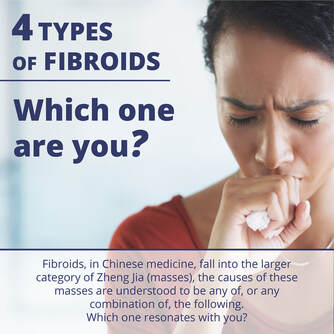 Uterine fibroids are benign growths on the wall of the uterus. They represent the most common gynecological non-cancerous tumors in reproductive females. It is estimated that 80% of women will have uterine fibroids at some point in their reproductive years. Many are symptom free and unaware, but for some women, fibroids can cause heavy bleeding, irregular periods, abdominal bloating and back pain (even though these symptoms are often wrongfully normalized). Fibroids can even grow large and press on vital organs like the bladder or bowel, eventually leading to digestive or kidney problems. The cause is not well understood, however. The theory is that abnormal muscle cells in the uterus are affected by estrogen and other factors in a way that drives tumor growth. Western treatment depends on severity. If asymptomatic, treatment is not needed, if the fibroid/s cause pain or other problems, treatment may involve surgery to remove the fibroids but unfortunately they can return. The rate of recurrence is high, at 30%. Estrogen contributes to the growth of fibroids which makes hormone regulation a main focus of fibroid management. Lupron is a type of hormone therapy that acts on the pituitary gland to stop estrogen production and start early menopause. A hysterectomy to remove the uterus, however, is the only known way to guarantee prevention of recurrence and is obviously not a desirable option for women looking to preserve fertility. So, even with surgery, it is important to deal with underlying causes. Chinese medicine takes a more holistic approach. Fibroids, in Chinese medicine, fall into the larger category of Zheng Jia (masses), as do other growths related to women’s health such as ovarian cysts, endometriosis and reproductive cancers. The causes of these masses are understood to be any of, or any combination of, the following: Liver Qi stagnation The liver is the organ that regulates the movement of qi and stagnant liver qi can reveal itself as typical PMS symptoms: irritability, breast tenderness, and cramps. The liver is also the organ that helps to rid the body of excess estrogen, so it is definitely a worthy focus point from both an Eastern and Western perspective. Blood Stasis Blood follows qi, so long term qi stagnation can result in blood stasis which is considered when symptoms such as more intense cramping and clots are reported. Damp-Phlegm Improper diet and digestion is said to lead to a buildup of damp-phlegm in the body. This accumulation, when condensed by other factors (such as heat, cold or poor blood flow) is thought to set the stage for the growth of various masses in the body. Associated symptoms can include indigestion, bloating, weight gain, and sometimes a watery menstrual flow. Cold Accumulation Exposure to the cold, especially cold that affects the uterus can be another cause of blood stasis which can eventually lead to tumors. Menstrual pain relieved by warmth is a sign of cold in the uterus. Acupuncture and herbs can help eliminate or shrink smaller fibroids, as well as keep them from returning. Acupuncture redirects energy in the body to address patterns like blood stasis, cold, phlegm, and liver qi stagnation to help to restore a yin/yang (and consequently hormone) balance. Chinese herbs are associated with a 72% reduction in bleeding in a study where over half of the participants experienced a reduction in size or a complete disappearance of their fibroids! Another study compared treatment with acupuncture and herbs to treatment with a combination of herbs and steroids. All of the women saw some benefits, but the ones who had acupuncture treatment saw an overall greater reduction in the volume of their fibroids. A 2002 study looked at alternative medical approaches for uterine fibroids. Upon comparing alternative treatments, such as TCM, bodywork and guided imagery against conventional treatment, the researchers found that the patients thrived in the alternative medical group. Fibroids shrank or stopped growing in 59 percent of the alternative treatment group compared to only eight percent of those in the conventional treatment group. If you have any signs of fibroids, seek out a Western diagnosis, but also schedule some acupuncture to make sure you are addressing root imbalances, and so you can feel better fast! |
AuthorsRebecca M H Kitzerow is a Licensed Acupuncturist practicing in La Center, Washington. With over a decade of experience she has won 10 Nattie consumer choice awards from Natural Awakenings Magazine since 2014. Archives
July 2024
Categories
All
|
Photos from Hey Paul Studios, BeGreen_Studio, Pawel Pacholec, 1950sUnlimited, toulupaliaqaz, Joelk75, OnTask, Robert Gourley, cnu_sports, Mitya Ku, wuestenigel (CC BY 2.0), FootMassagez, 401(K) 2013, Mariana Heinz, @EdwardTerry, fishhawk, liverpoolhls, torbakhopper, Boemski, dolomitibl, Driscolltheque, Dave n Laura, Vaping360, MVWorks, Life Mental Health, MVWorks, mikefats, Scot Nelson, jfl1066, wZa HK, ruurmo, Guadalupe Cervilla, Army Medicine, GViciano, torbakhopper, adrigu, Saulo Cruz, Ben Cumming, marniejoyce, kcxd, JasonCorey, kanenas.net, Live to Create Photography, gm.esthermax, Unique Hotels Group, Zenspa1, mysiana, Tobias Lindman, Leader Nancy Pelosi, Kristoffer Trolle, swanksalot, Bill Selak, Parker Knight, stimpsonjake, Gedankensprudler, SuperFantastic, tonynetone, marniejoyce, JeepersMedia, Illusive Photography, 'Ajnagraphy', Iban Torras, scotted400, gtall1, dvanzuijlekom, BPPrice, Skley, torbakhopper, Renato Ganoza, anka.albrecht, QUOI Media, Public Domain Photos, Instant Vantage, Victor Tongdee, Free Grunge Textures - www.freestock.ca, sportEX journals, Nadja Tatar, angela n., marniejoyce, MVWorks, Karolina Kabat, Thomas Fisher Rare Book Library, UofT, ginnerobot, tracilawson, haven't the slightest, My Photo Journeys, Pierre Willemin, Florena_Presse, SuperFantastic, colindunn, zzkt, TraumaAndDissociation, ER24 EMS (Pty) Ltd., shixart1985 (CC BY 2.0), marniejoyce, Tomás Fano, freestock.ca ♡ dare to share beauty, Archives New Zealand, Jaykhuang, airdrie.m, Go-tea 郭天, OnTask, wuestenigel, focusonmore.com, Disney | ABC Television Group, Andrew Gustar, Didriks, ConstructionDealMkting, charlywkarl, barnimages.com, Lel4nd, runwaypilates, michaelstephanfotografie, McLevn, TraumaAndDissociation, eLife - the journal, Lars Plougmann, wuestenigel, shixart1985, boviate, davis.steve32, kevin dooley, @the.photoguy (insta), frederic.gombert, Feathering the Nest, Victor Tondee, shixart1985, wuestenigel, Joe K Gage, kennethkonica
 RSS Feed
RSS Feed
